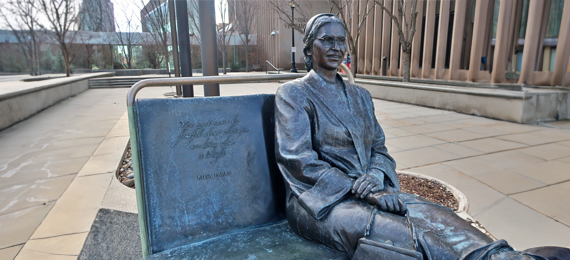
From John Lewis to Martin Luther King, you may hear about various leaders’ struggles for civil rights. Rosa Parks was called as mother of the civil rights movement. How did Rosa Parks contribute to the civil rights movement? She initiated the civil rights movement in the US when she refused to give her seat to a white man. Are you eager to know more about the Rosa Parks and the bus that sparked civil rights movements? Let’s delve into it.
Rosa Parks’s Early Life
She was born in Tuskegee, Alabama on February 4, 1913. Her parents, James McCauley, a carpenter, and Leona Edwards McCauley, a teacher were separated when she was two years old.
At the age of 11, she enrolled in Montgomery Industrial School for Girls and later entered Black Junior High School. She was forced to leave school because of illness in the family at age 16. In 1932, she married Raymond Parks, a long-time member of the National Association for the Advancement of Colored People. He supported her efforts to earn a higher degree.
Who was called the mother of the civil rights movement?
- A. Judy Chicago
- B. Ella Baker
- C. Diane Nash
- D. Rosa Parks
Roots of Activism
Both Rosa and Raymond became respected members of a large African American community. The non-white individuals faced several restrictions, including limitations on which schools they could attend, the requirement to purchase books exclusively from ‘Black’ libraries, and being confined to drinking water from designated fountains. In 1943, Rosa became chapter secretary after joining the Montgomery chapter of NAACP. Her name is also notable in black history month, observed every year in February to honor the recognition of African Americans.
Rosa Parks Bus Boycott
In 1955, Rosa Parks boarded a bus in Montgomery, Alabama to get home after a long day at work. She paid her fare and took an empty seat on the bus marked ‘colored.’ Montgomery had passed a law to separate bus passengers by race fifty-five years ago. The front part of the bus was reserved for white citizens and the back for black citizens. However, it became a custom that bus drivers asked non-white passengers to give up their seats for whites.
When the seats filled, the driver demanded Rosa Park and the other three passengers to give up their seats. But Rosa Parks refused to give up her seat. She said in an interview with BBC later, “I did this because I felt I was being violated as a human being. I had had a hard day at work, [I was] physically tired as well as mentally vexed. I was sick of this type of thing we had to endure as a people because of our race.”
Apart from Rosa Parks, several prominent women leaders fought for their rights. Look at these women in power who made history.
Rosa Parks Arrest
On 1 December 1955, Rosa Parks raised her voice on the bus and two police officers placed her in custody. The arrest was a consequence of the Jim Crow Laws, designed to marginalize black Americans and codify racism. On 5th December, she was given a suspended sentence after being found guilty of violating segregation, fined $10 and $4 in court costs.
Following her arrest, a bus boycott was organized by the Montgomery Association led by Martin Luther King. It lasted more than a year and brought a national spotlight. In December 1956, the case reached the US Supreme Court which ruled that bus segregation was unconstitutional. She was punished for her bravery and later lost her job and faced various death threats too.
When Did Rosa Parks Die?
In 2004, Rosa Parks was diagnosed with growing dementia. She was at home with her close friends on her last moments. Rosa Park died at the age of 92 on 24 October 2005. On 29 October 2005, her body was taken to St. Paul African Methodist Episcopal Church by a horse-drawn hearse. On the day of Rosa’s funeral procession, President George W Bush ordered all the flags in the United States public area and national capital to be flown at half-mast.
Hope you now have an idea about Rosa Parks early life, activism, bus boycott, arrest, and death. In 1999, she received the Congressional Gold Medal, calling her the ‘mother of the civil rights movement.’
